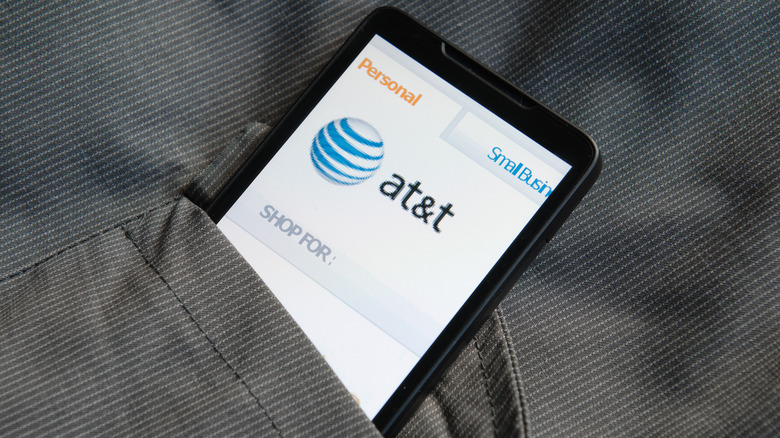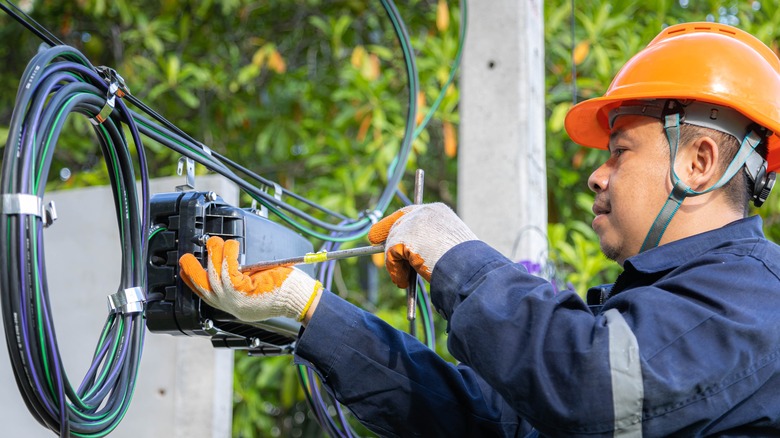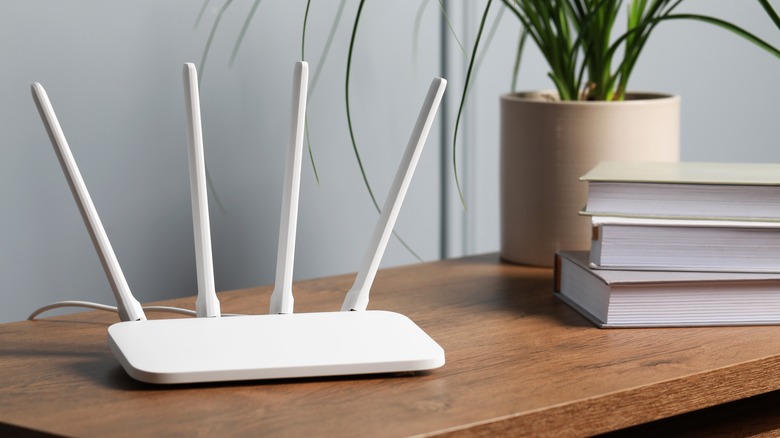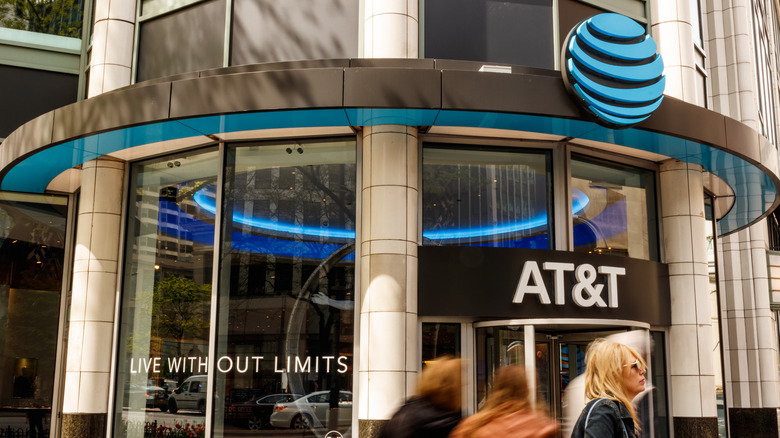What To Know Before Switching To AT&T Home Internet Service
AT&T, one of the biggest names in the telecommunications industry, offers a number of home internet plans, with varied download speeds, connection limits, and pricing options. The company claims to be the largest fiber internet provider in the United States. However, at a time when people are increasingly dependent on home plans from major internet service providers for work, education, and entertainment, it's important to do your due diligence and choose a company that's able to offer a reliable service at all times, and not just due to its household name.
While it might seem like a good idea to switch to a brand like AT&T for your home internet needs, there's a lot of fine print to be aware of. After all, you don't want to end up with a provider that will throttle your internet speed after you use a certain amount of high-speed data. Or even one with airtight contracts that will keep you locked in longer than comfortable. To help avoid such mishaps, we've put together a list of what it helps to know before you switch to one of AT&T's home internet plans.
A choice of plans
If you live in one of the 20+ states that AT&T covers, you are likely to find a home internet service that suits your needs. AT&T offers a range of plans from fiber internet to traditional wireline internet to fixed wireless internet for rural households. However, the company no longer offers DSL service.
If AT&T's fiber internet service is accessible in the area where you live, that's your best bet. The fiber plans offer hyper-fast speeds on secure lines, allowing everything from streaming to gaming on multiple devices. They also come with an ActiveArmor service of advanced privacy protection features. To discover if you qualify for AT&T's fiber internet service, key in your location on the company's website. It's available in a number of states, but there may be reasons why you're unable to get fiber internet in your area.
Prices for fiber plans vary. You can get a 300Mbps plan for as low as $55 per month. There are various ways to save money on your AT&T bill, but switching to fiber when the company is running a promotion is a good idea. Also, watch out for refunds on cancellation fees or free reward cards. Other options include AT&T's traditional wireline internet plans that start at $55 per month for a download speed of 25Mbps. A fixed wireless internet service, on the other hand, starts at $59.99 per month for a download speed of 10Mbps.
Contract limitations and equipment fees
There's nothing more frustrating than being locked into a contract that you're unhappy with, or needing to pay a hefty cancellation fee to get out one early. The good news is that AT&T's internet plans don't require an annual contract. In fact, even the least expensive fiber service, which starts at $55 per month, doesn't need one. The equipment fee is also included in your monthly bill, so there's no additional monthly fee, making the plan a whole lot more affordable.
For AT&T fiber, the company states on its website that "there is no price increase at 12 months." This means the price you sign up for is what you'll pay during the course of the service year and at the time of renewal. What's more, you only have to pay for your plan as long as it's serving your needs. You can always upgrade to another or move to a different internet service provider without having to worry about incurring a cancellation fee. However, familiarize yourself with the terms involved in canceling your AT&T wireless service, and read your contract to know how to cancel your home internet plan.
Another thing to note is that while there is no equipment or contract termination charge, AT&T does charge a one-time fee of $99 for the home installation. Contacting the provider yourself and asking if you qualify for the self-install kit or whether the fee can be waived can help you avoid paying this fee.
Does AT&T have data caps or throttle speeds?
If you're subscribed to an AT&T fiber plan, you won't have to worry about data caps. Anyone who opts for a fiber plan gets to take advantage of unlimited data connectivity without any speed-throttling issues. However, other AT&T home internet plans do have restrictions in place. For the fixed wireless internet plan, there is a data cap of 350GB per month. Similarly, if you're subscribed to an AT&T internet plan with speed tiers ranging between 768KB and 75MB, the ceiling is fixed at 1.5TB per month.
If you exceed the data cap, you can pay $10 to receive 50GB of additional data. The most you'll have to pay for overages of this nature is $100 per billing period. If you're subscribed to the internet 100 plan or the internet air plan, there's no data limit, provided you've opted for the $30 add-on.
How to switch to AT&T's home internet
If you already have an AT&T home internet plan and are looking to transfer the service to a new address, you'll need to contact a company representative. Typically, activation fees are waived for current customers. The details of your existing contract, and how soon it might expire, will affect this decision. However, if a new activation is to cost you, it will be the same amount as the initial installation charge. If you are looking to upgrade, you'll need to contact AT&T by phone, and a specialist will be able to help you find what's right for your needs and move the plan over to your new residence.
If you're currently with a different service provider, you can switch to AT&T fiber for free, provided you're eligible. After you pay your last bill, including the cancellation fee, you can send it over to AT&T to receive a refund. Typically, this refund is credited within six weeks of maintaining your new AT&T home internet plan.




